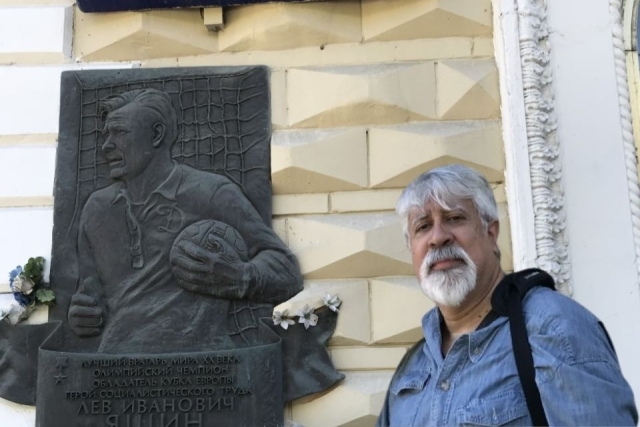
He is an acknowledged expert in Russian history, but Mauricio Borrero, Ph.D., Associate Professor, Department of History, St. John’s College of Liberal Arts and Sciences, is also a leading authority on the world’s most popular sporting event.
A sought-after expert on the World Cup and international soccer, Dr. Borrero has been interviewed recently by the BBC, Time magazine, and Qatar-based news agency Al Jazeera. He is on leave from St. John’s University this semester to write a biography of legendary Soviet goalkeeper Lev Yashin, whom Dr. Borrero calls a pioneer in world soccer.
The 22nd World Cup, hosted by Qatar, began on November 20 and continues until the championship match on December 18. The 32 teams include the United States, which is considered one of the long shots.
“Soccer is simple in a lot of ways, which has a lot to do with its global popularity,” Dr. Borrero said. “It is also accessible to people in poorer countries that might not have the infrastructure other countries have.”
“The World Cup has become such a pageant,” he continued. “There is a joy that comes with it, and the sport allows for such natural expression.”
Born to parents from Colombia—a nation richly rooted in soccer—Dr. Borrero has been a fan, observer, writer, and lecturer on the sport. He is married to Phyllis Conn, Ph.D., Associate Professor, Institute for Core Studies and St. John’s College. The couple’s daughter, Rebecca, is currently pursuing her Master of Arts degree in Environmental Sustainability and Decision-Making at St. John’s.
Dr. Borrero’s research interest in the World Cup grew out of his study of Soviet-era society, which included the role of sports in communist cultures.
The Soviet Union, led by its goalkeeper, Mr. Yashin, made the quarterfinals or better in every World Cup from 1958 to 1970. Russia has advanced that far only once since, when it hosted the event four years ago.
Mr. Yashin, Dr. Borrero said, broke the mold of stoic Soviet players. “He was known for his smile at a time when the perception of Soviet athletes was that they were mechanical,” Dr. Borrero said. “I thought it would be interesting for people to know more about this guy.”
From 13 teams in its inaugural year, 1930, the World Cup has grown to 24 teams, and now 32. The World Cup will expand to 48 teams when it is jointly hosted by the US, Canada, and Mexico in 2026.
As the World Cup has expanded, it has become an economic driver for the host nation. Qatari officials have predicted the tournament will generate $17 billion for the country’s economy.
Qatar is the first Middle Eastern nation to host the World Cup—another history-making moment in a tournament that has seen plenty of them, according to Dr. Borrero. Others include the 1970 tournament, won by Brazil for the third time; the 1994 tournament in the US, which brought the event to its largest untapped market; and the 2006 event hosted by a reunited Germany.
“It’s an English game, but it’s not exclusively English anymore,” Dr. Borrero said. “When you look at the history of the sport, and which was the most significant World Cup, it’s fair to say each country has its own narrative.”
The 1970 World Cup was the final one for legendary Brazilian forward Pelé, who won his third title—the most of any player—by scoring a goal and adding two assists in the championship game.
In 1966, England used its home-field advantage to win its only World Cup title. The drama of West Germany’s win in 1954, just nine years after the end of World War II, is often overlooked by the pageantry of the first tournament in Germany in the post-Cold War era, in 2006.
The 1954 and 2006 tournaments, Dr. Borrero said, made it acceptable for German fans to again embrace their national identity. “Germans were no longer wary of flying German flags,” he said. “Soccer has that kind of power.”
As for the United States, its high-water mark was in the initial tournament in 1930, when it finished third. In 1950, the US upset heavily favored England, but managed only a 10th-place finish. The US did not qualify for the World Cup for another 40 years.
The US women’s team, meanwhile, has become a world power. The US has won four titles since the Women’s World Cup debuted in 1991—the most of any nation—and is the reigning champion. The 1999 tournament, won by the US, is seen by many as validation of the commitment made decades earlier to women’s sports through Title IX.
Dr. Borrero said the women’s game has grown so much in the US, he could see mixed-gender competition in the future. It is not an opinion shared by all soccer authorities.
“Not everyone agrees, but I think the top women’s players could hold their own in a league with men,” he said. “One could envision a league where both genders compete. The quality of women’s soccer has just shot up.”
Related News
Alumna Celebrates Book Launch After Career Change
After developing a passion for helping the younger generation, Ashley Wilson ’14M.S.Ed. pivoted from a career in the music industry to work as an educator. She is also making her mark through her new...
Dean Jerrold Ross Conference Room Unveiled
On Tuesday, December 10, the newly renovated conference room on the fifth floor of Sullivan Hall was dedicated in honor of Jerrold Ross, Ph.D., former Dean of The School of Education . The renovation...
Institute for Catholic Schools Provides Educational Resources to Local Catholic School
The Institute for Catholic Schools (ICS) in The School of Education at St. John’s University recently donated approximately $2,800 worth of academic and sensory learning tools to Father Vincent...
